Canada! How Does It Work?
by Michelle Dean
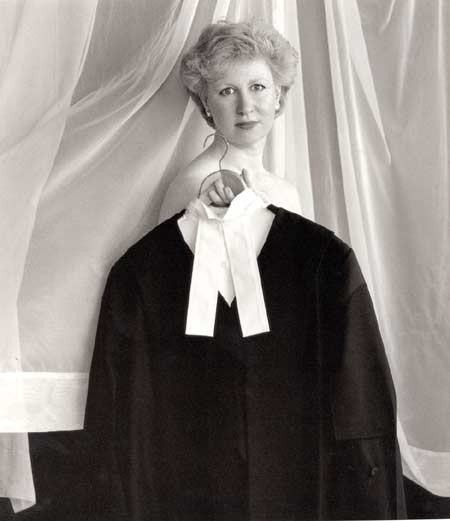
1. First things first: In the ’90s, one of the best things to watch on Canadian television (faint praise, that) was This Hour Has 22 Minutes. One of its most popular segments was “Talking To Americans,” which was, more or less, just what it sounds like. Posing as a journalist, comedian Rick Mercer would get Americans to do things like congratulate Canada on its recent legalization of the stapler. Most of the interviews were conducted in the street-ambush style that makes you feel sorry for the targets, because God, some people were just out shopping and I wouldn’t know the first thing about Mexican politics if you asked me on my way into the Gap. Less sympathetic were the public figures Mercer would occasionally manage to get near. He would get Mike Huckabee to congratulate Canada on having built a glass dome over its “national igloo”; he would get George W. Bush to thank “Prime Minister Jean Poutine” for his endorsement. And oh, Canadians would snicker, but their laughter carried with it a tailwind of depression. Acknowledging one’s own insignificance is funny — until it’s not.
I offer these prefatory remarks not because what I’m about to tell you about Canada, its politics and the upcoming election isn’t worthy of ridicule. Rather, I want to indicate that most American notions of why it’s ridiculous — the “eh” and the “aboot” — are… okay, the word I want here is “wrong.” Just wrong.
2. The election will take place on May 2. It was officially “called” this past Saturday, the day after a non-confidence vote felled the minority Conservative government led by our current Prime Minister, Stephen Harper. For those of you unclear on the mechanics of parliamentary politics: there is no set “term” between elections in Canada. Instead, the ruling party “calls” them. Unless, as here, the party is in the minority,1 in which case they can be defeated by a vote of non-confidence. Often non-confidence becomes an issue when the budget arrives, because Canadian culture retains, even in this multicultural age, a residue of Scottish Presbyterianism and we like to fight about money. But in the actual case, Friday’s vote took the form of a vote to hold the government in contempt of Parliament2 for failing to release financial projections about its purchase of 65 fighter jets and certain proposed anti-crime measures. This is the first time in Canadian history a government has been found in contempt of Parliament.3
But no one who isn’t an op-ed pundit cares about that. The real issue is that our politics is paralyzed — largely by mediocrity but also by certain historical circumstances related to the party machinery in Canada.
As illustration, we need look no further than the current strange marriage of the Conservatives with the New Democratic Party (NDP), which is our “far left” party4 — a blessed union which came about because the Conservatives, as a minority, needed to team up with another party. And so they ended up with the NDP, a party once once led by Tommy Douglas, the man who more or less invented Canada’s health care system. (Also, he’s Kiefer Sutherland’s maternal grandfather.) The NDP has never been seen as a viable governing party at the federal level — although the premiers (think “governor”) of Manitoba and Nova Scotia are NDP, currently — but the party usually manages to have at least some seats in the House.
The leader of the NDP is a man named Jack Layton, who, in what is an accurate reflection of the size of Canada’s populace, went to my mother’s high school; but, as she would tell you, she didn’t really know him that well because he was two years behind her.5 I’d like to add an anecdote about Layton here but there aren’t any. That is, other than the general and characteristically vague Canadian sense that he is “out there” when in fact he’s really the scion of a long line of Canadian politicians, because the political class in Canada, particularly in the East, seems to be hereditary. (Don’t even get me started on Justin Trudeau.) Which, by the way, is also a reason why almost everyone you’re about to hear about are white guys who are utterly unrepresentative of the population at large.6
3. Jon Stewart famously analogized the Canadian Conservative Party to “Gay Nader Fans For Peace,” and yes, I laughed. But it wasn’t all that close to the mark. The party is actually relatively young in Canada. It was formed, in 2003, from the ashes of what was once called the Progressive Conservative Party (I know, I know, just run with me here, and we all called them the “Tories” anyway) and a party then known as the “Canadian Alliance,” but which had formerly called itself the Reform Party. That last qualification allows me to report this bit of trivia: The original name proposed for the merged party was the “Canadian Conservative Reform Alliance Party” — no one apparently bothered to check the acronym before releasing the name to the public.
The Tories were the dominant center-right party in Canada when I was growing up. In American terms, the Tory party would have been described as socially liberal7 and fiscally conservative. Under the leadership of Brian Mulroney, Prime Minister from 1984 to 1993, the party suffered a fall from grace. Complaints included, but were not limited to: free trade policy, an unpopular sales tax, a perception of excessive closeness with America and the fact that Mulroney really is just an enormous horse’s ass of a person. He was forced to step aside shortly before the 1993 election.8 I’ve tried to stay away from numbers, but really what happened in 1993 can only be illustrated with figures: the Tories went from a 151-seat majority government to just two seats. Two seats! It never really recovered and, after limping through the next few elections, merged with the Alliance.
In the meanwhile, the Alliance had crept up to fill the political space vacated by the Tories. The Reform Party came out of the West, specifically, the province of Alberta. If Canada has a Texas (and let us say for our purposes here today that it does, but then never again), it is probably the province of Alberta — its oil reserves appear to have engendered similarly individualistic politics. In its early days, the Reform Party tended towards social conservatism and was headed first by a Ross Perot-esque figure known as Preston Manning, who had as his chief policy adviser — wait for it! — a young Stephen Harper.
Which is to tell you that Stephen Harper does not spring from the long Canadian tradition of “progressive” conservatism. Rather he’s emerged from the fringes of what is viewed in Canada as extreme right-wing politics. He is virulently anti-same-sex-marriage, although he could never defeat it politically. He “jests” that the NDP’s existence “is kind of proof that the Devil lives and interferes in the affairs of men.” He admired George W. Bush’s grasp of Middle East politics. Perhaps most damningly, in an incident you might actually have heard of, in late 2008 he managed to avoid a looming non-confidence vote by “proroguing” Parliament, which nearly set off a Constitutional crisis.
In short, Stephen Harper is pretty far outside what “Canadian consensus” might be said to exist. Few people, particularly of the political and chattering classes, seem to actively like the man.
4. So why is a guy like that Prime Minister?
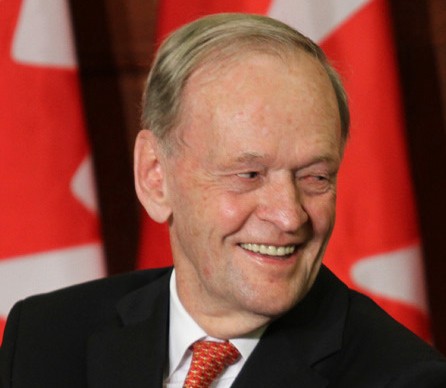
The answer has a lot to do with the third of Canada’s major political parties, the Liberals. This is the party of the one Canadian politician most Americans have heard of — Pierre Trudeau. But when it comes to the current Canadian political situation, a more important figurehead to know is Jean Chrétien, who succeeded Trudeau and served as Prime Minister from 1993 to 2003. In his own way, Chrétien was an odd but colorful figure in politics. His face was partially paralyzed, which gave his speaking style a loping quality. He looked frail on television, and styled himself “le petit gars de Shawinigan” (the little guy from Shawinigan), but was built like a lumberjack. He demonstrated this to great effect in 1996 when, confronted by a protester in full view of the cameras, he coolly grabbed the interloper by the throat to shove him aside.
With the Tories gone and the right split between two parties, Canada was essentially a one-party state in the Chrétien years. He ruled for a little over ten years, holding three elections, in each of which he sailed easily back into majorities. With each success, he grew more arrogant — entertainingly so. My favorite example came, in 2001, when Queen Elizabeth II nominated the now-disgraced Conrad Black for a peerage. Black’s newspapers, and Black himself, were critical of the Chrétien government. Another important fact about Black, which you may well already know, is that he had an abhorrent personality. Truly abhorrent! So Chrétien decided to dust off the law books and found himself a 1919 law called the “Nickle Resolution” which prevented Canadian citizens from receiving titular honors. Ultimately Black was forced to renounce his Canadian citizenship in order to become a Lord, although not before he did a lot of delicious public whining about it. I know of no Canadian who does not cackle in glee when Black’s name is mentioned nowadays. Oh, except maybe David Frum, but no one likes him.
In 2003, Chrétien became embroiled in a series of patronage scandals that forced him to to step aside in favor of his formerly much-adored Finance Minister Paul Martin. But the public perception of general Liberal corruption — an image that many people believe Martin himself stirred up in an effort to oust Chrétien — remained so strong that Martin could not keep the party in power. To this day they have not recovered from the Chrétien era.
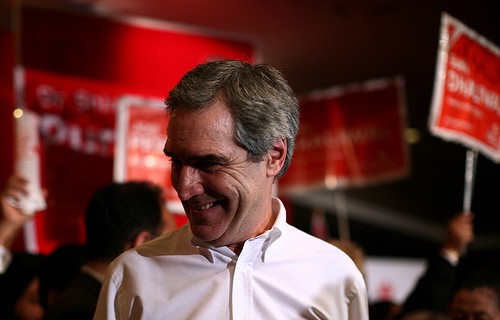
Today, the Liberal party is headed by Michael Ignatieff. What’s wrong with Michael Ignatieff, you might ask? He’s smart, a real scholar; he’s a perfect standard-bearer, right? Well, here is the thing about Michael Ignatieff: He was out of Canada enjoying an illustrious academic career from 1978 to 2005, when he returned to Canada in a transparent move to position himself for leadership. And, as I’m sure you’ve by now picked up on, Canadians have a fraught emotional relationship with the United States, and particularly with those who go there to work. We call it the “brain drain” and lament the phenomenon — yet those who return home receive scant welcome. Which is the hard truth that Ignatieff has discovered. Being out of the country for too long suggests that you view yourself as “too good” for it, at least where the political culture is concerned. Anyway, I’d go on about Ignatieff, but this Adam Gopnik article will serve you just fine. I’ll only mention that he might have better ingratiated himself had not one of his initial moves been oversharing to a Globe and Mail reporter that “[h]is sexual initiation took place at a campground north of Toronto; he remembers the gravel against his knees and elbows was excruciating.” Suffice to say the Liberals should have made another choice. While anything can happen in a month, few expect that Ignatieff will manage to push Harper out.
5. The other pertinent factor in current Canadian politics, and the one that really deserves a primer all its own, is the presence of a Québec separatist party, the Bloc Québécois, at the national level. Here I have to get a little serious on you. The short and overly abridged version of the story is simply that yes, most people in Québec speak French as a first language (in Canadian parlance, are “francophone”), most people in what is sometimes termed the “Rest of Canada” do not, and there is an entirely separate culture in Québec that has evolved from that distinction. Few Canadians I know, even the most intransigently “anglophone” among them, would disagree with that, assuming they have spent any length of time at all in Québec.
But it’s not merely a cultural or linguistic difference that’s at issue. We negotiated the “re-patriation” of the Constitution in 1982 — effectively writing Great Britain out and including a shiny new Bill of Rights. In an incident known as, I’m not kidding, the “Night of the Long Knives,” Québec was cut out of those negotiations, and because of that little maneuver, Québec’s government has never ratified the Constitution, even to this day. Efforts to negotiate some kind of accord have failed, and the issue of Québec sovereignty was put to a referendum in 1995 that came frighteningly close to passing. Interest in actual separation has faded since then; it’s hard to say why exactly, except that it probably has something to do with the resurgence of the Québec economy from the late 1990s into the 2000s.
Nevertheless, Québec voters apparently still feel that a distinctively Québécois interest ought to be defended at the national level, and the Bloc currently holds 49 seats in the House. It is led by a bland though kind of rat-like man called Gilles Duceppe, who has held his post since 1997. What Québec’s “distinct” interest consists of, federally speaking, isn’t clear. The Bloc styles itself as a “progressive” party, because it favors strong intervention by the state in social policy, for example. But the separatists have also been tarred by accusations of racism. When the 1995 referendum was lost, then-Premier and leader of the provincial version of the Bloc, the Parti Québécois, Jacques Parizeau drunkenly slurred on national television that he blamed “money and the ethnic vote.” (Personally I find old white Québécois men no more nor less racist than old white men anywhere, but your mileage may vary.)
The upshot is, by occupying all those seats, the Bloc effectively creates a situation where, unless one national party is ascendant — as during the Mulroney or Chrétien periods — minority governments in Canada have become a way of life.
6. Are you depressed yet? Nearly every Canadian I know is, about this. It’s funny, because with the exception of the Québec issue this is not a fractured country. Unlike in the States, the Canadian problem isn’t that there is a politically viable faction of people who are seriously threatening to abolish health care or make this a Christian country or nuke some country answering to the description “Islamic.” The problem, instead, is an overwhelming sense of complacency, brewed up simultaneously by the mediocre candidates, the general paralysis in the legislature, and the peculiar though distinctly Canadian sense that we ought to at least be grateful that things here are “okay, if not great.”
It is almost like we enjoy being disgruntled.
1 For those not versed in Canadian parliamentary politics: When the party with the most seats in the house does not have more than 50% of the seats, it’s a “minority government.”
2 We have a bicameral legislature, but when Canadians refer to Parliament they generally mean the House of Commons. Our Senate is appointed, and notoriously useless. There’s another wrinkle here that involves a Queen and a Governor-General but basically the realpolitik of the thing is as described above.
3 That said, this was the sixth time in Canadian history that a government was felled by a non-confidence vote. That makes it sound more common than it actually is. I grew up thinking of minority governments as rare. But since 2004 we’ve more or less continuously had them. Before that, the last one was in 1979 — it lasted about nine months.
4 Canadians and Americans label the political spectrum differently. As a schoolchild I was taught to identify the American Democrats as a center-right party, a fact I mention to give you a sense of how “out there” the NDP would seem in an American context. (Caveat: While in college at McGill, I was a member of the campus NDP, though I actually never officially joined the party. I did, however, attend a conference about the future of the party held in the summer of 2002. After that conference, however, I dropped my involvement.)
5 In fact, I feel I must add to note 4 that there are likely connections I have that I don’t even know about. Canada is damned small, and I went to law school in Canada, which is an even smaller constituency is the source of a truly appalling number of politicians. I met Layton once, I think, but have retained nothing of the encounter, though he’s my MP (Member of Parliament) now and I’ll probably vote for him. The other day I caught sight of a prominent opposition figure commenting casually on a friend’s Facebook wall.
6 Another part is language politics, which I don’t have time to get into fully, but which — short version — effectively mandate bilingualism in national political leaders, albeit to varying degrees.
7 In Canada, “liberal” does not mean “leftist.” Sometimes you’ll hear reference made to “small-l liberals” if a Canadian wants to use the term in the American way. See note 4 above on the different labeling of the political spectrum.
8 His Justice Minister (although she was in National Defence by the time he stepped down), a woman by the name of Kim Campbell, took over as leader of the Progressive Conservatives, becoming Canada’s first lady prime minister. She is pictured up top.
Michelle Dean’s writing has appeared, among other places, at Bitch, The American Prospect and The Rumpus. She sometimes blogs here.
Photos of Chrétien and Ignatieff via Ignatieff’s Flickr account. Second photo taken by Dave Chan.
James Garner Is Still Alive
Of all the actors whose charm rests mainly on the sense that they don’t really give a shit and are pretty much just having a good time, James Garner may be my favorite. I don’t know that I’d rush right out to read a memoir he wrote, but I will certainly look around for something on the Netflix the next time I’m aimlessly flipping channels.
Some Brief Impressions Of The Village Voice Choice Eats Event, Including Thoughts On The Term...
Some Brief Impressions Of The Village Voice Choice Eats Event, Including Thoughts On The Term “Foodie”

Walking up to the 69th Armory in Gramercy (Is that what that area at 26th street and Lexington is called? Or is that Murray Hill? I always have trouble differentiating it as anything other than the place where the people-I-went-to-college-with-who–I-don’t-necessarily-really-hang-out-with-anymore-although-they-still-show-up-on-my-Gchat-and-I-definitely-read-their-status-messages-on-the-reg live and consider themselves to be “downtown.”) and seeing the line of half Asian/half not-Asian people wrap, literally, around the entire block, you would have thought the Village Voice’s food event Choice Eats would be a complete disaster. But once you entered the large room, sectioned off convention-style with booths and booths of restaurants, it was actually pretty organized and without that really crowded feeling that comes with things that are poorly conceived and then oversold. Honestly, the woman who walked by me while talking loudly to her friend said it best when she rhetorically asked (not to me): “How many pulled pork sandwiches can one person eat?”
Here’s some of what you, if you weren’t there, missed:
Asian people are really into food and taking pictures of food. A few weeks ago, writer Ben Detrick tweeted an intensely correct observation identifying Yelp as, “The internet’s premier site for learning what Asian women think about restaurants,” and about half of the Choice Eats event felt like an IRL Yelp. There were lots of Asian girls with SLRs hanging around their neck standing in my way as I tried to get to the Del Posto chocolate and eggplant dish. The other half of the Choice Eats was just normie white people. Nothing new to see here, folks.
“Foodies.” Are you into food? Cool! I 100% agree that eating is great. In fact, some food is really dope. You know what undermines all of these positive sentiments I have towards you, person who also agrees with me that food can invoke some real genuine happiness? The fact that you’re calling yourself a “foodie.” I don’t know why this term is so offensive, maybe it’s because there’s a sort of implied haughtiness or something, but you’re better than that. We clearly have a lot in common, let’s not ruin what we have going.
But is it a VALUE? A weird phenomenon that happens in the city is people’s willingness to wait and wait and wait for things that they perceive to be a deal. On days when there’s free or really cheap ice cream or yogurt, you’ll see long, long lines of people, often in suboptimal weather, just waiting for the opportunity to save (no more than) $1-$2. I actually love savings, so I get how and why this happens, but it seems like, at some point, you have to respect yourself and your time and value it more for more than $1-$2 for an hour. So where does Choice Eats fall on this scale? Well, on the one hand, there is a line, and it was very, very long. But on the other hand, you’re essentially paying $35–45 to eat and drink as much as you want of this pretty good food. Now, I can’t tell you how to live your life, but I think this one leans more on the value side of the spectrum. So keep that in mind for next year.
Photo by Jeffrey Tastes, from Flickr.
Predictable Thing Happens To Product With "Funny" Name
“’Circle City Marketing and Distributing, doing business as Candy Dynamics, Indianapolis, IN, is issuing a voluntary recall of Toxic Waste Short Circuits Bubble Gum. . . . The product is imported from Pakistan.’ Tests reveal one batch of product contains elevated levels of lead.”
The Subway, 25 Years Ago
“The story: in 1986 I made a round trip through the USA and Canada. The starting point was New York. So I filmed some scenes in Manhattan. And was going in the underground at 43nd St & Timesquare. I filmed with a big ARRIflex 16mm camera with a 120m magazine with 7250 Kodak 16mm color reversal Tungsten 400 ASA film and a Schneider Cine Xenon 1:2/16mm lens . This equipment is good for 10 Minutes recording duration at 25 f/sec. After I time a man comes to me and said, he´s a cameraman at ABC and filming at the subway is strictly forbidden without any permission and police is on the other end of the platform. So I was leaving the station, but I had these beautiful pics of the old times in the New York subway.” This thing is 10 minutes long, but it will definitely appeal to both transit and New York City nostalgists. [Via]
Republicans Design Massive Metaphor For Legislative Process
“In a purely symbolic move in the ongoing budget and spending cut negotiations, House Republicans plan to pass on Friday a measure called the ‘Prevention of a Government Shutdown Act.’ Passage will do nothing to avoid a government shutdown since no deal has been reached with Democrats in the Senate and the White House. But it will give the House GOP the opportunity to claim that they’ve tried to prod the Senate toward a deal on spending cuts.”
Is This the Most 90s Movie of All the 90s?
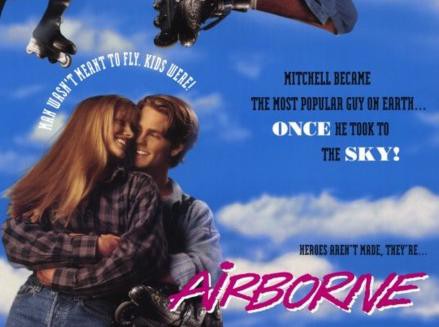
One man’s quest to identify the “Most 90s Film of All Time” continues with this frightening installment on Airborne. Directed by the exec producer of “Castle,” who is also the director of Elektra and Reign of Fire — no lie, not the best movies ever made, God bless! — Airborne is about a California high school surf-dude who is forced to move to Cincinnati, where is he is mocked and then proves his awesomeness in a rollerblading race. It includes Jack Black in his second film role, and it sounds terrible and delightful. It’s a real standout in the genre.
What if the Mail Service Was Some Hot New Startup?
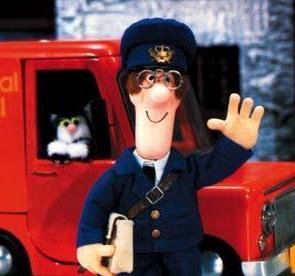
“So, like, we need to send something important to someone somewhere else so you’re saying we just, uhh, leave it in a box by the street? And we’re just to trust somebody to come get it and make sure it gets to the right person?” That is an excellent point. Man, we would be on Quora mocking the heck out of that business model. And then? Our theorist goes on: “I think if mail were to be invented today, too many people would be a little bit too curious about how they could manipulate it and they would go online and join forums to discuss it and they would wind up creating this whole ecosystem of weirdos who are interested in screwing with the mail, feeding off each other and stewing in their own obsession until their sick little games are somehow legitimated by society to enough of a degree to validate it as something people are ‘born with,’ like furries and those guys who fuck pillows with faces stitched into them.”
House That Looks Like Hitler: The Story Behind The Story

The Wales domicile that bears an apparent resemblance to the 20th century’s most genocidal tyrant has taken the Internet by storm, reports the Sun. But who noticed the similarities in the first place? Step forward youth worker Charli Dickenson, 22: “I walk past the house all the time — but I’d never noticed the Hitler likeness before. But then, at the weekend, I was in the car with my boyfriend and we were stuck in traffic — and I just said to him: ‘That house looks like Hitler’. We both laughed about it. I took a picture and posted it on Twitter.” And thus a legend was born. [WARNING: Link includes groan-inducing Sun pun.]
Happy Birthday, Ian Ziering
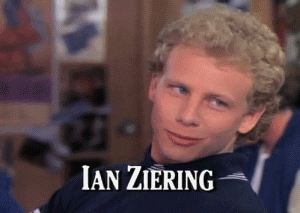
Ian Andrew Ziering, who captivated America’s television viewers of the ’90s with his gritty performance as the deeply conflicted Steve Sanders on the original version of “Beverly Hills 90210,” turns 46 today. Those of us who were around during the show’s initial run can still remember the electricity in his portrayal, the palpable suspense that pervaded each of his scenes. The choices he made as an actor were so groundbreaking that it is difficult to recall exactly how brave and unique they were at the time, particularly now that they’ve been completely integrated into the mainstream. But he was never showy or precious about it; what made the work so powerful was the subtle sense of transformation he was bringing to the archetype of “spoiled rich kid.” While he’s made subsequent appearances on “Dancing With the Stars” and some other stuff (probably), the massive display of craft which made his identity simultaneous to that of the character into which he breathed such life has probably been a detriment to the rest of his career: To many of us, he will always be Steve Sanders and Steve Sanders alone. And there’s no shame in that. Sometimes you create something that belongs to the ages, and in the act of that creation, it recreates you. Such is the case here. Anyway, happy birthday, SteveIan.
